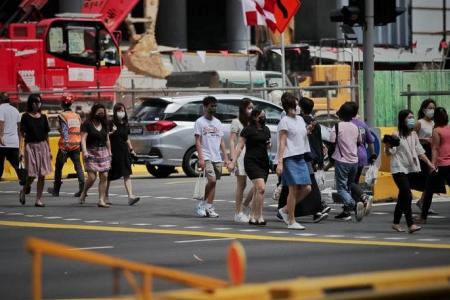All you need to know about Omicron and the Covid-19 spike in Singapore
With Singapore experiencing a spike in Covid-19 community infections that were largely driven by newer Omicron variants as well as fears of a new wave, ST answers some questions on what you need to know to be prepared.
On the Omicron new variants - BA.4 and BA.5
Q: Why are there so many Omicron sub-variants?
A: Omicron has spread rapidly and this has given it many opportunities to mutate and also acquire specific mutations of its own.
Some of these sub-variants include BA.1, BA.2, BA.3, BA.4 and BA.5.
There have been sub-variants of earlier versions of the virus, such as the Delta variant. However, Omicron has overtaken these, most likely due to its increased transmissibility.
Q: Should we be worried?
A: Currently, international and local evidence show that the severity of BA.4 and BA.5 infections is similar to that of earlier Omicron strains.
Experts have also noted that it will evolve constantly so the process of discovering new variants will continue even after Covid-19 becomes truly endemic.
A recent study also noted that people infected with the earliest version of the Omicron variant may be vulnerable to reinfection with later versions even if they have been vaccinated and boosted. The study said that newer sub-lineages "notably evade the neutralising antibodies elicited by Sars-CoV-2 infection and vaccination" the researchers found in test-tube experiments.
Q: Are these new strains dominant here?
A: Singapore has witnessed a 23 per cent week-on-week increase in Covid-19 community infections, with the rise largely driven by an increased spread of the newer Omicron subvariants BA.4 and BA.5.
However, the BA.2 subvariant still accounts for the bulk of infections, but the proportion of BA.4 and BA.5 infections is rising, the Ministry of Health (MOH) said in an update on Tuesday (June 21).
Q: Will there be a change in safe management measures here?
The current safe management measures, including the requirement to wear masks while indoors and vaccination-differentiated measures for some higher-risk activities, will remain, MOH said.
MOH will continue genomic surveillance for circulating subvariants in Singapore, including requiring some infected individuals to take an additional government-funded polymerase chain reaction (PCR) swab for genomic sequencing.
Q: Do vaccines protect against an Omicron infection?
A: Being fully vaccinated with a booster shot provides strong protection against infection with Omicron, at least in the short term. But this may become less effective over time, although there is still strong protection against serious illness if infected.
On changes in healthcare subsidies
Q: What are the changes to Covid-19 subsidy policy?
A: From 12:01am on July 1, subsidies at Public Health Preparedness Clinics (PHPC) and polyclinics for the treatment of respiratory infections will revert to pre-pandemic levels.
This means the flat $5 to $10 fee for such infections will no longer apply, though Singaporeans may still get other subsidies under other schemes.
Telemedicine subsidies for those who are mildly symptomatic and recovering at home will also revert to pre-pandemic levels from 12:01am on July 1. This refers to people under MOH's Protocol 2 definition.
Those under Protocol 1, who are at high medical risk or have severe symptoms but were discharged to a home setting, will continue to receive fully subsidised telemedicine care.
Antigen rapid tests and PCR tests will also continue to be provided at PHPCs and polyclinics to eligible individuals with symptoms at no charge.
Emergency department charges for vaccinated Singapore citizens, permanent residents and long-term pass holders with Covid-19 will also no longer be waived in all cases from 12:01am on July 1.
Currently, those who are fully vaccinated or medically ineligible for vaccination do not have to pay such charges.
This will no longer apply for those who are deemed not to require hospital admission or treatment at a dedicated facility.
But those who are assessed to require admission or treatment will continue to have their charges and inpatient bills fully subsidised.
On personal precautions
Q: What kind of personal precautions do I have to take?
A: There is no need to be unduly worried about being infected with Covid-19. Instead, one has to practise personal responsibility and personal hygiene at all times.
For instance, if you are feeling unwell, do not go out and wear a mask if you have to.
Get The New Paper on your phone with the free TNP app. Download from the Apple App Store or Google Play Store now


